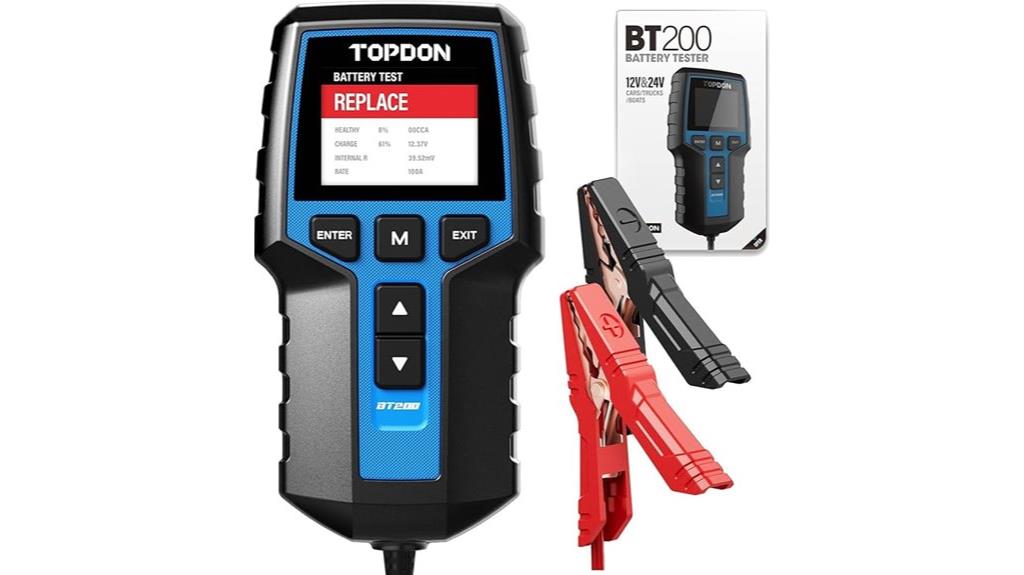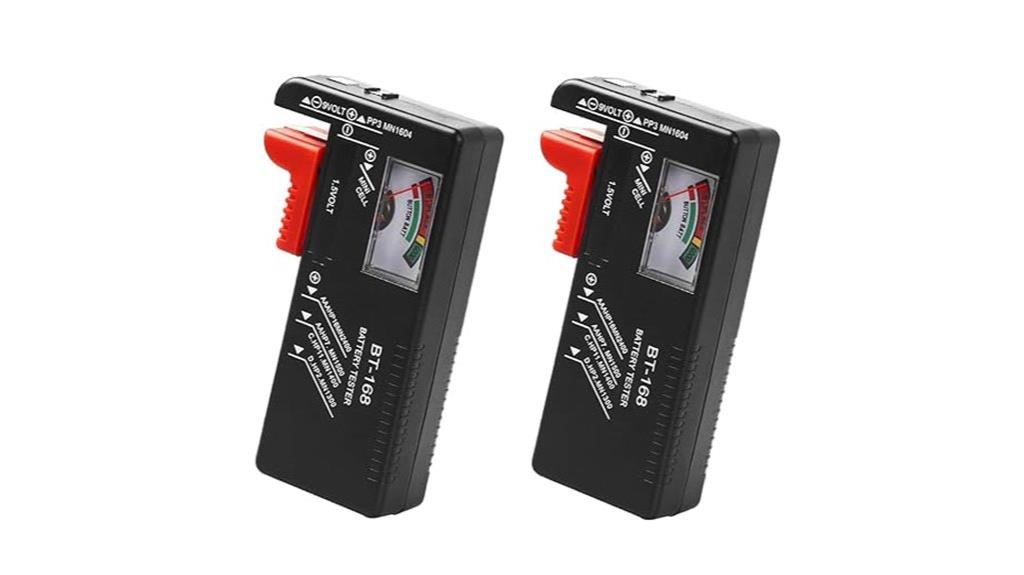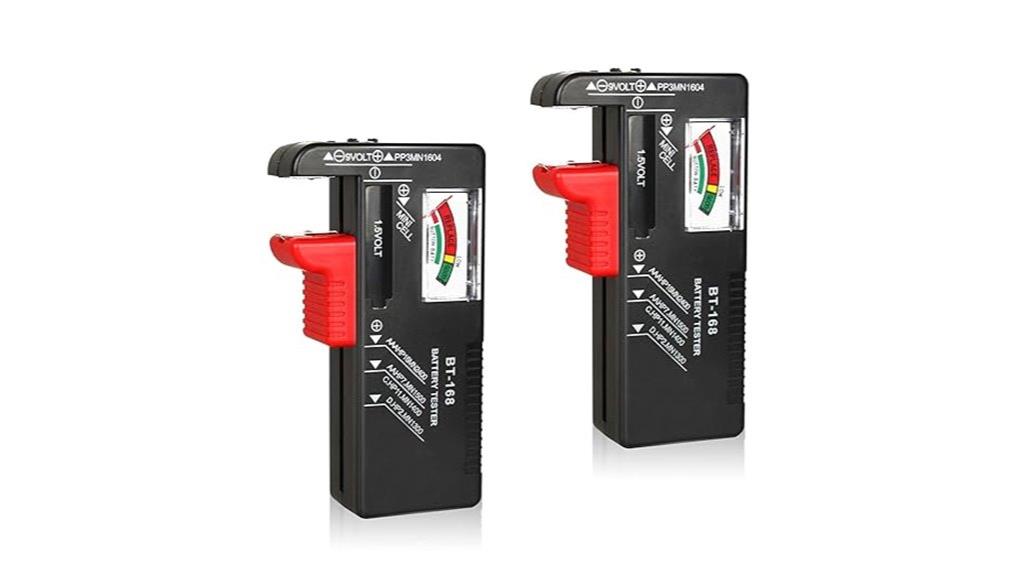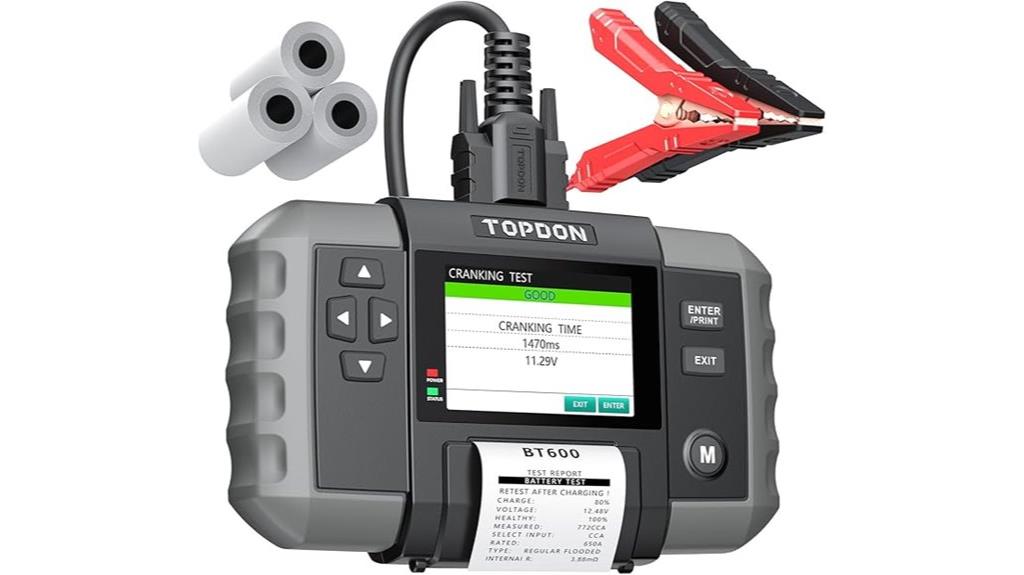If you’re after the best high-quality battery testers that give you accurate results, I recommend checking out top models like the TOPDON BT600, which offers thorough diagnostics and a built-in printer. Other reliable options include the D-FantiX and Tenergy T-333 for universal use, and the AUTEL BA101 for automotive needs. These testers combine durability, precision, and ease of use. Keep exploring to find the perfect fit for your testing needs and learn more about their features.
Key Takeaways
- High-quality testers offer precise voltage measurement within ±0.01V and industry-calibrated accuracy for reliable results.
- They support a wide range of batteries, including household, rechargeable, and specialty types like lithium-ion and lead-acid.
- Advanced features such as conductance technology and internal resistance testing ensure comprehensive battery diagnostics.
- Durable, user-friendly designs with clear displays enable quick, accurate assessments for both professionals and hobbyists.
- Proven reliability and compatibility with various vehicle and battery types guarantee consistent, trustworthy testing outcomes.
Battery Tester SL-049, Digital Battery Checker with LCD Display

If you’re looking for a reliable and easy-to-use battery tester, the SL-049 Digital Battery Checker with LCD Display is an excellent choice. It offers precise voltage readings and clear power level indicators, removing any guesswork. Compact and portable, it easily fits in drawers or bags, making it perfect for quick checks at home or on the go. Supporting most common battery types, including AA, AAA, 9V, and button cells, it also tests rechargeable batteries. The large LCD screen provides instant, accurate results with a color-coded bar—Good, Weak, or Poor—so you know when a battery needs replacing. It’s simple, efficient, and designed for long-lasting use.
Best For: Homeowners, technicians, and anyone needing quick, accurate battery health assessments for various household and button cell batteries.
Pros:
- Supports a wide range of common battery types, including rechargeable options.
- Easy-to-read LCD display with clear voltage and power level indicators.
- Compact and portable design for convenient use anytime, anywhere.
Cons:
- Requires one AAA battery (not included), adding an extra step for setup.
- Connection mechanisms may be slightly fiddly or less secure for some users.
- Testing slots may be less suitable for very large or unconventional battery sizes.
D-FantiX Battery Tester, Universal Battery Checker

The D-FantiX Battery Tester, Universal Battery Checker is ideal for anyone who regularly uses household batteries and wants a quick way to assess their remaining power. Its compact, lightweight design makes it easy to carry around and use at home or on the go. It works with common batteries like AA, AAA, C, D, 9V, button cells, and rechargeable options, requiring no external power—just insert the battery, and it activates automatically. The analog needle moves on a color-coded scale, indicating whether your battery is good (green), low (yellow), or needs replacing (red). It’s a simple, cost-effective tool that helps prevent unnecessary battery waste.
Best For: anyone who frequently uses household batteries and seeks a quick, easy way to check their remaining power without the need for external power or complex measurements.
Pros:
- Compact and lightweight, making it portable and easy to use anywhere
- Compatible with a wide range of household and rechargeable batteries
- Provides quick, visual indication of battery status to prevent unnecessary replacements
Cons:
- Does not measure actual battery capacity or detailed performance metrics
- Only indicates voltage level, so may not reflect true remaining capacity in some cases
- Limited to basic battery testing; not suitable for in-depth battery analysis
Tenergy T-333 Universal Battery Tester

The Tenergy T-333 Universal Battery Tester stands out for its ability to test a wide range of common household batteries, making it an ideal choice for anyone who needs a reliable, versatile testing tool. It supports various sizes, including AA, AAA, C, D, 9V, and button cells like CR123A, CR2, and CRV3, ensuring compatibility with most devices. The easy-to-read LCD display provides quick, accurate assessments of battery health, helping me identify poor, weak, or good batteries. Its simple design makes testing straightforward—just insert the battery, and I get reliable results. This tester helps save money, extends battery life, and prevents device failures.
Best For: households, hobbyists, and professionals who need a reliable, versatile tool to test a wide variety of common batteries quickly and accurately.
Pros:
- Supports a broad range of battery sizes, including AA, AAA, C, D, 9V, and various button cells
- Easy-to-read LCD display provides clear and quick battery health assessments
- Simple operation ensures accurate testing without requiring technical expertise
Cons:
- Limited to household and standard batteries; not suitable for rechargeable or specialized batteries
- Does not provide detailed voltage or capacity readings beyond basic health status
- Requires batteries (included) to operate, which may be inconvenient if the tester’s batteries weaken over time
TOPDON BT100 Car Battery Tester (12V Load Tester, Digital Auto Battery Analyzer)

For auto enthusiasts and professionals seeking quick, accurate battery diagnostics, the TOPDON BT100 Car Battery Tester stands out with its exhaustive analysis features. It tests 12V lead-acid batteries, including flooded, AGM, EFB, and GEL types, providing detailed data like SOH, SOC, Voltage, Current, and Rating. Its safe, passive testing allows diagnostics without charging the battery first. The device supports a wide range of vehicles and offers three key tests: health, cranking, and charging system checks. Compact and portable, it’s perfect for garages, auto shops, or DIY use. The intuitive menu and LED indicators make quick assessments simple, ensuring vehicle readiness and safety.
Best For: auto enthusiasts, professional mechanics, and DIY users seeking fast, accurate, and comprehensive battery diagnostics for a variety of 12V lead-acid batteries.
Pros:
- Provides detailed analysis including SOH, SOC, Voltage, Current, and Rating for thorough diagnostics.
- Supports a wide range of battery types and vehicle applications, enhancing versatility.
- Compact, portable design with intuitive controls and LED indicators for quick, easy assessments.
Cons:
- Limited to 12V lead-acid batteries; not suitable for lithium-ion or other battery chemistries.
- May require some familiarity with vehicle electrical systems for optimal use.
- Does not include a built-in printer or data export options for detailed reporting.
ANCEL BA101 Car Battery Tester, 12V Digital Automotive Alternator Meter

If you’re looking for a reliable and easy-to-use battery tester that covers a wide range of vehicle types, the ANCEL BA101 Car Battery Tester is an excellent choice. It offers quick, accurate diagnostics for battery health, voltage, charge status, and alternator performance. Compatible with flooded, AGM, GEL, and EFB batteries, it supports global standards like JIS, EN, DIN, SAE, and more. The device features an intuitive LCD display, intelligent chip, and secure crocodile clips for precise readings. With safety protections and broad compatibility, it’s perfect for cars, trucks, boats, and RVs, making routine maintenance straightforward and reliable.
Best For: DIY enthusiasts, automotive technicians, and vehicle owners seeking quick, reliable battery and alternator diagnostics across various vehicle types and battery styles.
Pros:
- Provides fast, accurate tests for battery health, voltage, charge, and alternator performance.
- Compatible with multiple battery types and supports global standards, ensuring broad usability.
- Features an intuitive LCD display, safety protections, and durable design for easy and safe operation.
Cons:
- Supports batteries only above 30 AH; batteries below this capacity are unsupported.
- Not compatible with lithium, 6V, 8V, or 24V batteries, limiting some applications.
- Requires correct input of battery specifications for optimal accuracy, which may be a learning curve for new users.
Battery Tester with LCD Display for AA, AAA, 9V, and Button Cell Batteries

A Battery Tester with LCD Display for AA, AAA, 9V, and Button Cell Batteries is ideal for anyone who needs a quick, reliable way to assess a wide variety of common household batteries. It’s compatible with many cylindrical types, including 9V and button cells, making it versatile for everyday use. The compact, lightweight design makes it easy to carry around or store at home. Its clear LCD display quickly shows battery health, helping you identify dead, weak, or good batteries without guesswork. This simple, accurate tool guarantees money by preventing unnecessary replacements and ensures your batteries are always ready when needed.
Best For: individuals and households seeking a quick, reliable, and versatile tool to test a wide range of common household batteries without the need for scientific precision.
Pros:
- Easy to use with a simple insert-and-read interface, suitable for all skill levels.
- Compatible with various battery sizes including AA, AAA, 9V, and button cells, offering high versatility.
- Compact and lightweight design makes it highly portable for home, travel, or on-the-go use.
Cons:
- Not suitable for testing rechargeable batteries or cells, limiting its scope for rechargeable battery management.
- May require some experience to accurately interpret borderline or ambiguous results.
- Does not provide precise scientific load testing, so it’s best for everyday, approximate assessments rather than detailed analysis.
Car Battery Tester 24V 12V Load Tester

The Car Battery Tester 24V 12V Load Tester stands out as an ideal choice for vehicle owners and professionals seeking quick, accurate diagnostics across a range of battery types. It supports 12V and 24V batteries, including flooded, AGM, GEL, and deep cycle models, making it versatile for cars, trucks, boats, and more. The tester evaluates battery health, starter performance, and charging systems in seconds using advanced conductance technology. Its portable design and clear 2.4-inch LCD screen make it easy to use outdoors or in a workshop. With a user-friendly interface and reliable results, it’s an essential tool to prevent breakdowns and ensure vehicle safety.
Best For: vehicle owners, auto repair professionals, and DIY enthusiasts seeking quick, accurate battery diagnostics for various vehicle types and battery configurations.
Pros:
- Supports both 12V and 24V batteries, compatible with multiple battery types including flooded, AGM, GEL, and deep cycle.
- Uses advanced conductance technology for rapid, precise testing results within seconds.
- Portable and user-friendly with a 2.4-inch color LCD screen suitable for outdoor and workshop use.
Cons:
- Limited to battery testing and does not perform other vehicle diagnostic functions.
- Requires familiarity with vehicle battery types for optimal use.
- The device may need calibration or updates to ensure maximum accuracy over time.
Car Battery Load Tester (BT500) for Automotive Systems

Car Battery Load Tester (BT500) stands out as an essential tool for both DIY enthusiasts and automotive professionals who need quick, accurate diagnostics. It supports 6V, 12V, and 24V batteries, handling ratings from 5 to 3000 CCA, making it versatile for various battery types like flooded, AGM, GEL, and EFB, but not lithium. The device offers extensive testing, including battery health, voltage, internal resistance, CCA, and charge status, along with starter and alternator tests. It delivers results with 99.99% accuracy, stored for reference. Designed with safety in mind, it features high-quality copper clips with reverse polarity, spark-proof, and over-voltage protections, ensuring safe, reliable operation.
Best For: DIY enthusiasts and automotive professionals seeking quick, accurate diagnostics of various vehicle batteries.
Pros:
- Supports a wide range of battery types and voltages (6V, 12V, 24V) with ratings up to 3000 CCA.
- Provides comprehensive testing including battery health, voltage, internal resistance, CCA, and charging system analysis.
- Ensures safety with features like reverse polarity, spark-proof, over-voltage, and over-temperature protections.
Cons:
- Not compatible with lithium batteries, limiting its use for some modern vehicles.
- Requires turning off electrical devices during charging tests, which may be inconvenient in some situations.
- May be more complex for beginners to operate without proper guidance or understanding of vehicle electrical systems.

If you need a reliable way to test multiple battery types on the go, this pack of two lightweight, compact battery testers is an excellent choice. They easily fit in your bag or pocket, making them perfect for quick checks anywhere. Designed to accurately measure voltage for AA, AAA, C, D, 9V, and button cell batteries, they give clear, easy-to-interpret readings. No batteries are needed, so they’re always ready to use. Simply insert the battery, and you’ll see a precise indicator of its power level. This helps prevent buying or using weak batteries, saving you both time and money.
Best For: individuals who frequently test various batteries on the go to ensure device reliability and avoid unnecessary replacements.
Pros:
- Compact and lightweight, perfect for portability and travel convenience.
- Compatible with multiple battery types, including AA, AAA, C, D, 9V, and button cells, offering versatile testing options.
- No power source needed, ensuring immediate use without batteries or charging.
Cons:
- Limited to voltage testing; does not measure capacity or overall battery health.
- May require some practice to interpret indicator bars accurately for new users.
- Not suitable for testing rechargeable batteries or batteries with complex discharge curves.
2Pcs Battery Tester Checker for Household Batteries

For anyone needing a quick and reliable way to check household batteries, the 2Pcs Battery Tester Checker is an excellent choice. It’s compact, lightweight, and easy to use, testing AA, AAA, C, D, 1.5V, 9V, and small button cells without needing batteries itself. Simply connect the tester to the battery, and the analog needle shows whether it’s good (green), low (yellow), or needs replacement (red). It works for both rechargeable and non-rechargeable batteries, helping you avoid unnecessary waste. Perfect for home use, it’s a practical, inexpensive tool for quickly verifying battery health before use or disposal.
Best For: households, DIY enthusiasts, and anyone needing a quick, affordable way to check the health of various household batteries.
Pros:
- No batteries required for operation, making it convenient and cost-effective
- Compatible with multiple battery types including AA, AAA, C, D, 1.5V, 9V, and small button cells
- Compact, lightweight, and portable for easy use anywhere
Cons:
- Build quality may be lightweight and less durable over time
- Tests voltage rather than precise capacity, which may not reflect actual battery life
- Some units may malfunction or require repair due to inconsistent quality control
TOPDON BT600 Car Battery Tester with Built-in Printer

The TOPDON BT600 Car Battery Tester with Built-in Printer stands out as an ideal choice for professional auto technicians and shop owners who need quick, accurate diagnostics with immediate documentation. It tests 12V and 24V lead-acid batteries, including flooded, AGM, GEL, and EFB types, covering a wide range of vehicles. With advanced conductivity technology, it provides precise results for battery health, CCA, and system diagnostics. The 3.5-inch color display ensures easy operation, while the built-in thermal printer allows instant printing of test reports. Its support for data review and USB updates makes it a reliable, versatile tool for efficient vehicle maintenance.
Best For: auto technicians, shop owners, and battery specialists needing quick, accurate diagnostics with on-the-spot report printing.
Pros:
- Highly accurate testing with up to 99.5% precision in battery diagnostics
- Supports a wide range of battery types including flooded, AGM, GEL, and EFB
- Built-in thermal printer for immediate report printing and professional documentation
Cons:
- Software updates are only compatible with Windows, limiting cross-platform use
- The device’s complexity may require some training for optimal operation
- Limited to lead-acid batteries; not suitable for lithium or other battery chemistries
Dlyfull Battery Tester with LCD Display for Various Button Cell Batteries

Designed for those who frequently handle various button cell batteries, the Dlyfull Battery Tester with LCD Display offers a versatile and reliable way to quickly assess battery health. It supports a wide range of cylindrical batteries, including AA, AAA, 9V, and specialty types like CR123A and CR2, making it suitable for household and electronic device use. The crisp LCD screen clearly indicates whether a battery is poor, weak, or good based on voltage levels. Using it is simple—just insert the battery, and the device shows the status instantly. Its compact, lightweight design fits easily into pockets or bags, perfect for on-the-go testing.
Best For: individuals who frequently handle and need to quickly assess the health of various household and electronic device batteries.
Pros:
- Supports a wide range of cylindrical batteries including AA, AAA, 9V, and specialty types like CR123A and CR2.
- Features a clear LCD display that provides quick and accurate battery health readings.
- Compact and lightweight design makes it portable and easy to carry for on-the-go testing.
Cons:
- Not designed to test or recharge rechargeable batteries.
- Requires inserting batteries into the tester, which may be inconvenient for some users.
- Limited to testing cylindrical batteries; cannot test other battery formats or non-battery power sources.
Car Battery Tester (TOPDON BT300P)

If you’re looking for a reliable and fast car battery tester, the TOPDON BT300P stands out as an excellent choice. It’s compatible with 12V lead-acid batteries, including flooded, AGM, Gel, and EFB types, suitable for cars, trucks, motorcycles, RVs, boats, and more. The device quickly delivers accurate results in just 3 seconds, with a 99.5% accuracy rate, evaluating battery health, starter motor, and charging system conditions. Its 2.4-inch color screen offers clear readings, and the built-in thermal printer makes printing diagnostic reports easy. Designed with safety and durability in mind, it’s a versatile tool for maintaining ideal vehicle battery performance.
Best For: vehicle owners, mechanics, and DIY enthusiasts who need a fast, reliable, and accurate tool for diagnosing 12V battery health and electrical system issues across various vehicle types.
Pros:
- Rapid testing results within 3 seconds with 99.5% accuracy.
- Compatible with a wide range of 12V lead-acid batteries, including flooded, AGM, Gel, and EFB types.
- Built-in thermal printer for easy, on-site documentation without needing ink or cartridges.
Cons:
- Limited to 12V systems, not suitable for 24V or higher voltage vehicles.
- Small 2.4-inch screen may be less visible in very bright outdoor conditions.
- Requires thermal paper refills for printing, which may incur additional costs over time.
Factors to Consider When Choosing High Quality Battery Testers

When selecting a high-quality battery tester, I focus on several key factors to guarantee it meets my needs. I look at the compatibility range, measurement accuracy, and how easy it is to use, along with build quality and extra diagnostic features. Considering these points helps me choose a reliable tester that offers precise results and long-lasting performance.
Battery Compatibility Range
Choosing a high-quality battery tester means ensuring it can handle a wide variety of battery sizes, chemistries, and voltage levels. I look for testers that support common sizes like AA, AAA, C, D, 9V, and button cells, so I don’t need multiple devices. It’s vital they test both standard and rechargeable batteries, such as NiMH or lithium-ion, for full versatility. I also check that the device can accommodate different voltage levels, typically from 1.2V to 24V, covering household, automotive, and specialty batteries. Support for various chemistries—alkaline, lithium, NiMH, lead-acid—is essential for accurate readings. Additionally, I consider if the tester can evaluate specialty batteries like CR2, CR123A, or 18650, which are common in electronics and high-drain devices.
Measurement Accuracy & Precision
Accurate voltage readings are the backbone of a reliable battery tester, so I prioritize devices that minimize measurement errors. High-quality testers should deliver precise readings, typically within ±0.01V for small batteries and ±1% for larger ones. I look for testers that use real-load testing and specific discharge resistors, as these evaluate true battery health instead of just open-circuit voltage. Advanced conductance technology also enhances reliability, especially for rechargeable batteries. The best testers are calibrated to industry standards and comply with certifications, ensuring trustworthy measurements. Consistent accuracy across different battery types and sizes is essential, so I prefer testers with well-calibrated sensors and adjustable testing parameters. This focus guarantees I get dependable, repeatable results every time.
Ease of Use Features
Ease of use is a crucial factor that can make or break your experience with a battery tester. I look for models with clear, intuitive displays like LCD screens or analog meters that give immediate results. A simple, streamlined process—just insert the battery and get the reading—saves time and frustration. User-friendly interfaces are essential, so I prefer testers with labeled buttons or straightforward controls that are easy to understand. I also prioritize devices that don’t require external power sources or complicated setups, making testing quick and hassle-free. Compact, lightweight designs are a bonus, allowing me to carry and use the tester comfortably in various settings. Overall, ease of use ensures reliable testing without unnecessary complications, making my work more efficient and less stressful.
Build Quality & Durability
When selecting a high-quality battery tester, guaranteeing it’s built to last is vital, especially if you plan to use it frequently or in tough environments. Durable materials like reinforced plastics, metal contacts, and corrosion-resistant components help the tester withstand daily wear and harsh conditions. Reliable contact with battery terminals is essential, so look for testers with spring-loaded or heavy-duty clamps that reduce false readings caused by poor connections. Durability features such as shock resistance, reinforced casing, and sealed components protect against drops, impacts, dust, and moisture, extending the device’s lifespan. High-quality testers also undergo rigorous testing standards to ensure long-term performance. Choosing a well-built tester minimizes malfunctions, guarantees consistent and accurate results, and provides peace of mind over time.
Additional Diagnostic Capabilities
Choosing a battery tester with advanced diagnostic capabilities can considerably enhance your ability to identify and address electrical issues early. These testers go beyond measuring voltage, evaluating internal resistance, load capacity, and overall health metrics like SOH (State of Health). Some models also test alternator performance, charging system integrity, and detect faults such as diode failures or voltage spikes. Multi-parameter assessments provide a thorough view of the battery and vehicle’s electrical system, enabling precise troubleshooting. Many devices include data storage or printing options, making it easy to track and document test results professionally. With these enhanced features, you can spot potential problems before they cause unexpected failures, ultimately extending battery lifespan and ensuring reliable vehicle operation.
Frequently Asked Questions
How Do Battery Testers Differentiate Between Rechargeable and Non-Rechargeable Batteries?
Battery testers differentiate between rechargeable and non-rechargeable batteries by analyzing voltage, internal resistance, and chemistry indicators. I look for specific voltage ranges and resistance levels that are typical for each type. Rechargeables tend to have lower internal resistance and can handle higher voltages during tests. By using these parameters, a good tester accurately identifies the battery type, ensuring I get reliable results every time.
Can High-End Testers Measure Battery Capacity Over Time Accurately?
Yes, high-end testers can measure battery capacity over time accurately. I’ve used premium testers that precisely monitor how a battery’s performance declines, giving me reliable data on its remaining capacity. These devices use advanced algorithms and stable power sources to guarantee consistent results, so I trust their readings for maintenance and replacement decisions. If you want long-term accuracy, investing in quality testers is definitely the way to go.
Are There Specific Testers Designed for Lithium-Ion or Other Advanced Battery Chemistries?
Yes, there are testers specifically designed for lithium-ion and other advanced chemistries. I recommend looking for models that support these chemistries explicitly, as they measure parameters like voltage, internal resistance, and capacity more accurately. These testers often have specialized sensors and software to handle the unique characteristics of lithium-ion batteries, ensuring reliable, precise results for maintenance, safety checks, or performance assessments.
How Do Environmental Conditions Affect the Accuracy of Battery Testers?
Environmental conditions can really impact the accuracy of battery testers. Extreme temperatures, high humidity, or dust can interfere with the readings by affecting the tester’s sensors or the battery’s performance. I always make sure to test batteries in a stable, clean environment, and at moderate temperatures. This way, I get more reliable results and avoid misdiagnosing a battery’s health due to environmental interference.
What Maintenance Is Required to Keep Battery Testers Functioning Reliably?
To keep my battery tester reliable, I regularly clean the contacts with a soft brush and make certain there’s no corrosion buildup. I also store it in a dry, cool place to prevent moisture damage. Periodically, I check the calibration against a known good battery, and I replace test leads if they show signs of wear. Staying proactive like this guarantees my tester’s accuracy when I need it most.
Conclusion
Choosing the right battery tester can save you time and prevent unexpected breakdowns. Did you know that over 60% of car battery failures happen because of overlooked small issues? By investing in a high-quality tester, you’re more likely to catch problems early and keep everything running smoothly. Whether for household batteries or car engines, the right tool makes all the difference. Stay proactive and keep your batteries in top shape!









